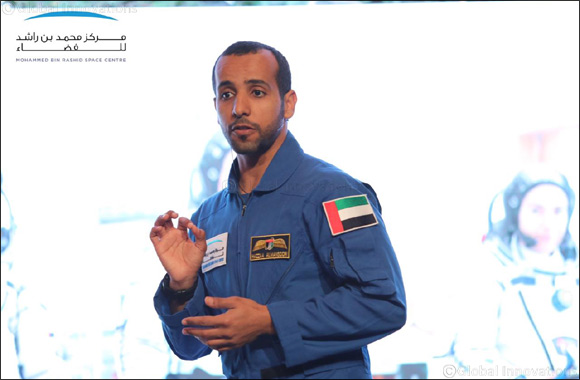
Humans in Space Symposium discusses what it takes to be an astronaut
Dubai, UAE, 13 November 2019: The second day of the 22nd edition of the International Academy of Astronautics (IAA) Humans in Space Symposium (HIS), held at the Dubai International Convention and Exhibition Centre, witnessed huge participation from experts and specialists in the space sector, and students from different educational levels. The UAE is the first country in the MENA region to host this conference, from 11th to 14th November, 2019.
Day 2 highlighted the human side of space exploration, the challenges facing the space sector, space robotics, global collaboration in space, the Emirates Mars Mission (EMM) – Hope Probe, and what it takes to be an astronaut.
Day 2 also witnessed a panel discussion about future space exploration, lunar gateway, and space robotics. The session included William H. Paloski, from NASA, Oleg Kotov, from IBMP, Maria Cristina, from ASI, and Mr. Grégory Pedersen, from Airbus Defense and Space. It was moderated by Fatima Lootah, from the Mohammed bin Rashid Space Centre (MBRSC).
Mariam Al Shamsi, Director of the Space Science Department at MBRSC, spoke about the EMM, which is expected to launch in July 2020. Following a journey of several months, the probe is expected to enter the Red Planet’s orbit prior to December 2021, coinciding with the Golden Jubilee of the Union.
Day 2 also included a panel discussion entitled ‘What it takes to be an Astronaut?’, moderated by Mariam Al Zarouni, Head of the Studies Unit at MBRSC. The panelists were Adnan AlRais, Director of the Remote Sensing Department at MBRSC, Hazzaa AlMansoori and Sultan AlNeyadi, Oleg Kotov and Aleksander Misurkin, from the Roscosmos, and Thomas Reiter, from the European Space Agency (ESA).
The astronauts confirmed that the training phase is essential to enhance their skills and enable them to use the equipment at the ISS, and identify several aspects of life aboard the station, such as preparing food and to identify several aspects of life on board the station such as food preparation, daily life and emergency and how to survive in various environments.
Sultan AlNeyadi highlighted that they were trained on handling emergency situations, especially nitrogen gas leakage or low air pressure, as well as winter survival training to allow us to survive in extreme weather conditions using equipment on board the space capsule, in case the landing capsule blows off course causing them to land in a hostile environment. AlNeyadi also shared the funny situations that happened to them during the training period.
Hazzaa AlMansoori, the first Emirati astronaut, explained the details of the UAE’s first mission to the International Space Station (ISS), and the challenges that he faced during the mission, to students of different educational levels.
AlMansoori told the students that his passion for astronomy led him to join the armed forces and later became a military pilot at Khalifa bin Zayed Air College. His military background played a huge role in his excellence in the preparatory tests prior to the mission.
AlMansoori also highlighted the significance of the scientific experiments that he conducted aboard the ISS, and their importance in supporting the global scientific community, especially the experiments related to physical changes, which happen to the astronaut aboard the station. He also told them about the tension he felt during the launch phase and how he overcame it.
AlMansoori said that he regularly communicated with the ground station and informed them of his daily schedule. He stressed that he had a very busy schedule throughout his eight-day-trip aboard the ISS.
AlMansoori explained to the students that the temperature and humidity aboard the ISS are controlled by the ground station, where the temperature is 22 degrees Celsius. The timing on the ISS is according to GMT.
AlMansoori called on the students to work hard, study about space, and utilise the opportunities provided by the UAE’s wise leadership, to contribute to further achievements in the space sector.
The UAE was chosen as the host due to MBRSC’s proposal submission to the IAA. The proposal was discussed at a meeting by the IAA Board of Trustees, headed by Peter Jankowitsch, President of the IAA, on the sidelines of the United Nations Conference on the Exploration and Peaceful Uses of Outer Space (UNISPACE).
IAA, which is based in Paris, France, is an independent non-governmental organisation recognised by the United Nations in 1996. Through its distinguished international programmes and conferences, the IAA aspires to promote the development of space navigation for peaceful purposes and to honour individuals who have distinguished themselves in space science and technology.
Share
Home >> Travel, Tourism, Airline and Hotel Section
Emirates expands its Premium Economy offering on services to Male and Colombo
du launches Experience X internship program to empower UAE national youth
Experience Art, Adventure, and Heritage at Dubai Culture's Summer Camps 2025
DAFZ Announces Opening of Fakeeh Health's First Smart Clinic in Dubai
Big Wins Continue with PrivilegePLUS at Mercato & Town Centre Jumeirah!
Christophe Robin's Summer Travel Essentials for Good Hair Days
Dubai Airports launches DXB Greet & Go: a smart, QR code-based pickup service at Terminal 3
Dubai Sports World Returns for Action-Packed August Edition
The World Between Lines and Symbols: An Interactive Art Workshop at Mohammed Bin Rashid Library
